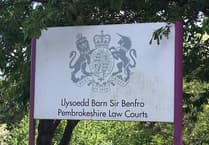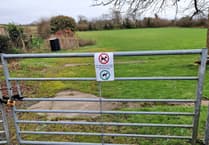If you dump rubbish illegally in Carmarthenshire you might find yourself on camera – and potentially in court.
Council chiefs have agreed to implement recommendations to crack down on fly-tipping, which blights built-up areas and the countryside and uses up valuable publicly-funded resources.
The seven recommendations include more use of CCTV cameras in hotspot areas, and follow a fly-tipping review by a group of cross-party councillors.
The group heard that cameras deployed in 2022 outside Carway Football Club, Kidwelly, where rubbish was being dumped, led to 36 fines being issued to perpetrators. There was also a prosecution, with further legal action pending.
A report before cabinet members, who discussed the review at a meeting on October 16, said: “It was clear that the use of CCTV at Carway evidenced the benefits of such an approach – it was acknowledged that an increased CCTV activity in a co-ordinated way could be of benefit in reducing further fly-tipping in known areas.”
Councils have various sanctions at their disposal for environmental crime, but need the public to report and ideally bear witness to the crimes. Litter fines of £125 can be issued for up to one black bin bag of illegally-dumped rubbish. It’s £400 for one to eight black bin bags, and prosecution for more than eight.
The council dished out 147 litter and fly-tipping fines in 2022-23, double the previous year, and undertook six prosecutions.
The review, however, found that there were many ways of recording fly-tipping data, which in turn led to duplication in the collating of incidents. It also identified further duplication of efforts as one team investigated fly-tipping on public land while another one investigated it on private land, although the two teams did talk to one another.
The two teams have 13 staff combined, including one line manager.
The review’s recommendations include exploring a “one team approach” instead of the current two, more accurate collation of data, and the clearing up of fly-tipped rubbish during the investigation phase.
The review said there was a direct correlation nationally between the number of fly-tipping incidents and the state of the economy, along with factors such as absent landlords and “transient populations”.
Accepting the findings, Cllr Aled Vaughan Owen, cabinet member for climate change, decarbonisation and sustainability, said he and council officers would begin the work of implementing the recommendations.
Council leader Darren Price said it was important work. “It impacts every one of use, and every ward,” he said.




